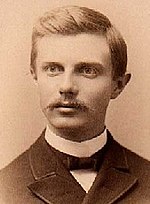Frontier Thesis
The Frontier Thesis or Turner Thesis is the conclusion of Frederick Jackson Turner that the wellsprings of American exceptionalism and vitality have always been the American frontier, the region between urbanized, civilized society and the untamed wilderness. In the thesis, the frontier created freedom, "breaking the bonds of custom, offering new experiences, [and] calling out new institutions and activities." Turner first announced his thesis in a paper entitled "The Significance of the Frontier in American History," delivered to the American Historical Association in 1893 at the World Columbian Exposition in Chicago.
Turner set up an evolutionary model (he had studied evolution with a leading geologist), using the time dimension of American history, and the geographical space of the land that became the United States. The first settlers who arrived on the east coast in the 17th century acted and thought like Europeans. They encountered a new environmental challenge that was quite different from what they had known. The most important difference was vast amounts of unused high quality farmland (some of which was used by a few thousand Indians for hunting grounds.) They adapted to the new environment in certain ways — the sum of all the adaptations over the years would make them Americans. The next generation moved further inland. It discarded more European aspects that were no longer useful, for example established churches, established aristocracies, intrusive government, and control of the best land by a small gentry class. Every generation moved further west and became more American, and the settlers became more democratic and less tolerant of hierarchy. They became more violent, more individualistic, more distrustful of authority, less artistic, less scientific, and more dependent on ad-hoc organizations they formed themselves. In broad terms, the further west, the more American the community.
Turner's thesis quickly became popular among intellectuals. It explained why the American people and American government were so different from Europeans. It sounded an alarming note about the future, since the U.S. Census of 1890 had officially stated that the American frontier had broken up. The idea that the source of America's power and uniqueness was gone was a distressing concept. Many, including future president Theodore Roosevelt, believed that the end of the frontier represented the beginning of a new stage in American life and that the United States must expand overseas. For this reason, some see the Turner thesis as the impetus for a new wave in the history of United States imperialism.
Ironically, the Great Plains began losing population during Turner's lifetime, and have continued to do so for the last 80 years. Several hundred thousand square miles now have less than 6 persons per square mile — the density standard Turner used to declare the frontier "closed". Large areas have less than 2 persons per square mile. The number of counties below this "frontier density" increased by 14 between 1980 and 2000. In fact, today Kansas has more "frontier" counties (using Turner's definition) than it did in 1900, and 35 of the 53 counties in North Dakota qualify as "frontier". [1]
The Canadian political thinker Charles Blattberg has developed an interesting contrast between the American frontier process as described by Turner and the notion that, in Canada, settlement is best described as having involved the moving of a "border" from east to west. According to Blattberg, a border assumes a significantly sharper contrast between the civilized and the uncivilized since unlike with a frontier process the civilizing force is not supposed to be shaped by that which it is civilizing. Blattberg criticizes both the frontier and border "civilizing" processes.
See also
Further reading: Scholarly studies
- The Frontier In American History by Frederick Jackson Turner
- Ray Allen Billington. The American Frontier (1958) 35 page essay on the historiography
- Billington, Ray Allen. Frederick Jackson Turner: historian, scholar, teacher. (1973), highly detailed scholarly biography.
- Billington, Ray Allen, ed,. The Frontier Thesis: Valid Interpretation of American History? (1966); the major attacks and defenses of Turner.
- Billington, Ray Allen. America's Frontier Heritage (1984), an analysis of Turner's theories in relation to social sciences and historiography
- Billington, Ray Allen. Land of Savagery / Land of Promise: The European Image of the American Frontier in the Nineteenth Century (1981)
- Bogue, Allan G. . Frederick Jackson Turner: Strange Roads Going Down. (1988), highly detailed scholarly biography.
- Etulain, Richard W. Does the Frontier Experience Make America Exceptional? (1999)
- Etulain, Richard W. Writing Western History: Essays on Major Western Historians (2002)
- Etulain, Richard W. and Gerald D. Nash, eds. Researching Western History: Topics in the Twentieth Century (1997)
- Faragher, John Mack ed. Rereading Frederick Jackson Turner: "The Significance of the Frontier in American History". (1999)
- Hine, Robert V. and John Mack Faragher. The American West: A New Interpretive History (2000), deals with events, not historiography
- Hofstadter, Richard. The Progressive Historians--Turner, Beard, Parrington. (1979). interpretation of the historiography
- Jensen, Richard. "On Modernizating Frederick Jackson Turner," Western Historical Quarterly 11 (1980), 307-20. in JSTOR
- Lamar, Howard R. ed. The New Encyclopedia of the American West (1998), 1000+ pages of articles by scholars
- Milner, Clyde A., II ed. Major Problems in the History of the American West 2nd ed (1997), primary sources and essays by scholars
- Nichols, Roger L. ed. American Frontier and Western Issues: An Historiographical Review (1986) essays by 14 scholars
- Paxson, Frederic, History of the American Frontier, 1763-1893 (1924)
- Richard Slotkin, Regeneration through Violence: The Mythology of the American Frontier, 1600-1800 (1973), complex literary reinterpretation of the frontier myth from its origins in Europe to Daniel Boone
